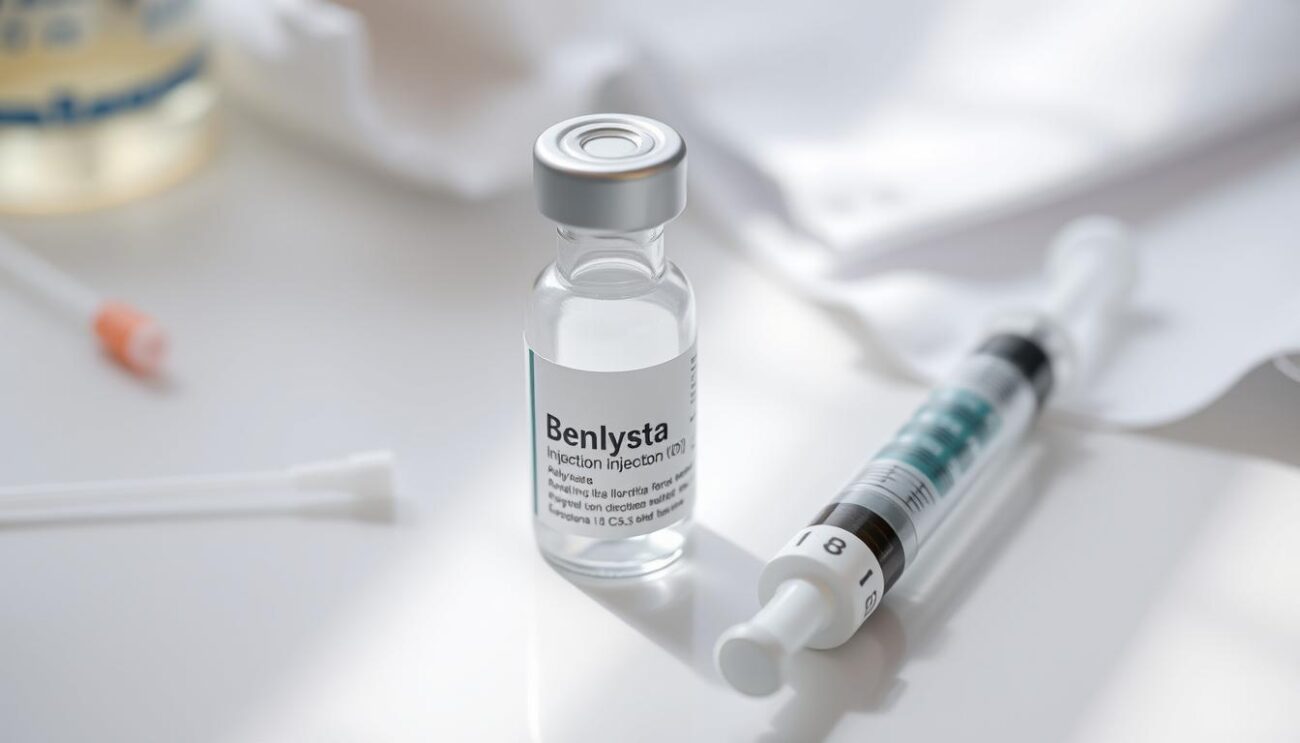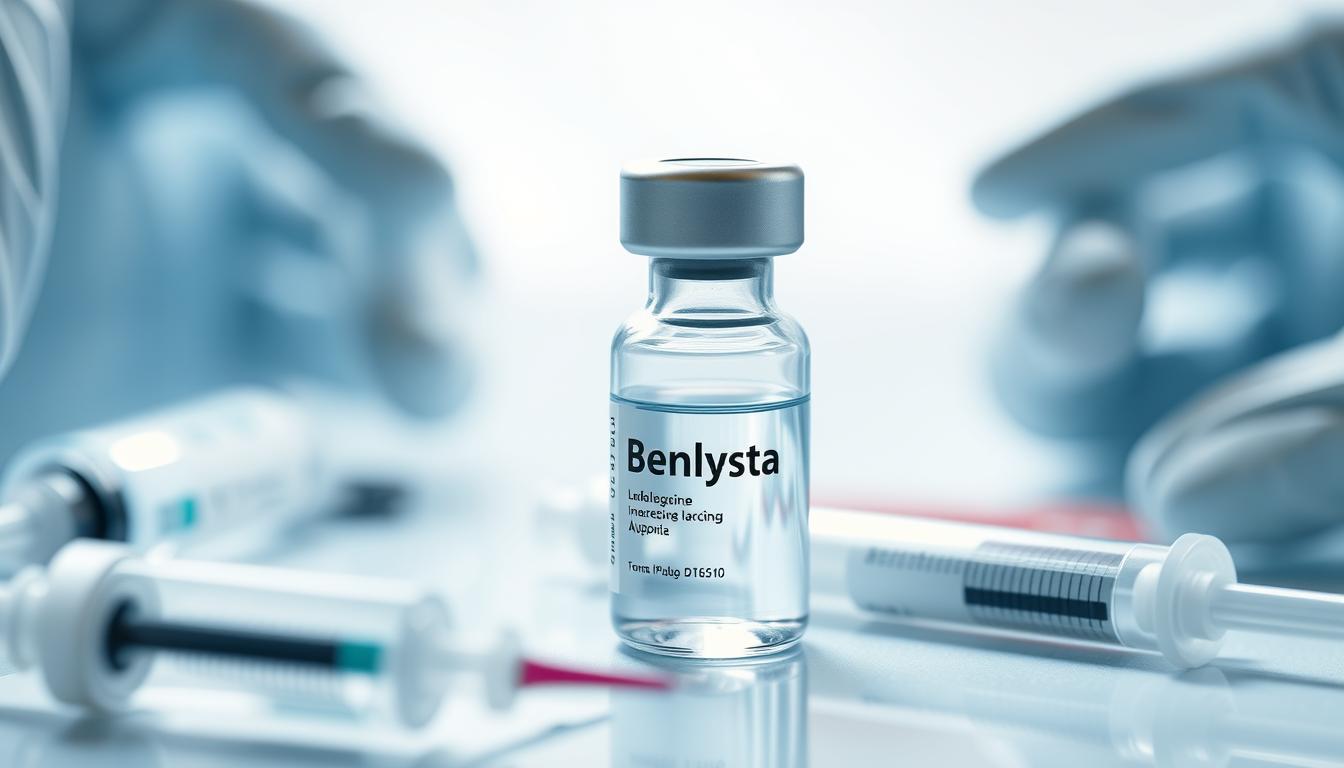Living with an autoimmune disease like lupus can be a rollercoaster of challenges. But what if there was a biologic therapy that could help manage the debilitating symptoms and flare-ups? Enter Benlysta, a prescription medication approved to treat certain types of lupus in adults and some children. But how exactly does this intravenous (IV) infusion or subcutaneous injection work, and who can benefit from it? Let’s dive in and explore the details.
Key Takeaways
- Benlysta (belimumab) is a biologic drug approved to treat active systemic lupus erythematosus (SLE) and active lupus nephritis in adults and children 5 years and older.
- It works by reducing the number of autoantibodies that attack the body in people with lupus, a chronic autoimmune disease.
- Benlysta is available as an intravenous (IV) infusion or a subcutaneous (under the skin) injection.
- The medication was first approved by the FDA in 2011 and has since become an important option for managing lupus symptoms.
- While generally well-tolerated, Benlysta can have side effects, and certain precautions are necessary, especially for older adults and pregnant women.
What is Benlysta?
Benlysta: A Biologic Drug for Lupus
Benlysta is a biologic medication, meaning it is made from living cells, not chemicals. It contains the active ingredient belimumab, which is a monoclonal antibody that targets and reduces certain autoantibodies involved in the autoimmune response in lupus. This unique mechanism of action sets Benlysta apart as a valuable treatment option for those living with this chronic and complex autoimmune condition.
FDA Approval and Availability
Benlysta was first approved by the FDA in 2011 to treat adult patients with active systemic lupus erythematosus (SLE). In 2019, the FDA expanded the approval to include children ages 5 years and older with active SLE or active lupus nephritis. Benlysta is only available as a brand-name medication and does not have a generic or biosimilar equivalent.
Clinical studies have shown that Benlysta can effectively reduce disease activity and the risk of severe lupus flares when added to common lupus medications. Patients have reported improvements in symptoms affecting the muscles, joints, skin, mouth, kidneys, and immune system. Additionally, Benlysta has been found to help reduce the need for high-dose steroids, which can have significant side effects with long-term use.
Benlysta is available in a convenient pre-filled autoinjector for subcutaneous use, allowing for once-weekly administration. The autoinjector features several safety elements, such as an Inspection Window, Grey Stopper, Ring Cap, and Gold Needle Guard, to ensure proper and safe use. Proper storage, handling, and disposal guidelines must be followed to maintain the integrity and effectiveness of the medication.
How Does Benlysta Work?
Benlysta is an innovative medication that targets the underlying mechanisms of lupus by reducing the levels of a specific protein called B-lymphocyte stimulator (BLyS). This protein plays a crucial role in the production of autoantibodies, which are antibodies that mistakenly attack the body’s own tissues and organs, leading to the development of lupus symptoms.
By inhibiting the activity of BLyS, Benlysta helps to decrease the number of autoantibodies in the body, thereby minimizing the immune system’s destructive attack on the body’s own tissues. This targeted approach to lupus treatment helps to alleviate the underlying cause of the disease, rather than just managing the symptoms.
Mechanism of Action: Targeting Autoantibodies
The mechanism of action of Benlysta is centered around its ability to target and reduce the levels of autoantibodies, which are a hallmark of lupus. By binding to and neutralizing BLyS, Benlysta effectively inhibits the survival and proliferation of B cells, which are responsible for producing autoantibodies.
This reduction in autoantibody levels helps to minimize the immune system’s attack on the body’s own tissues and organs, which is the primary driver of lupus symptoms. Clinical studies have shown that Benlysta can lead to a 41% reduction in anti-double-stranded DNA antibody levels over 52 weeks, as well as decreases in other key B-cell subsets associated with lupus.
“Reductions in autoantibodies, total circulating B cells, and B-cell subsets, as well as increases in complement proteins, were consistent with findings from systemic lupus erythematosus (SLE) trials involving BENLYSTA.”
By targeting the underlying mechanism of action of lupus, Benlysta represents a significant advancement in the treatment of lupus, offering patients a new approach to managing this complex and challenging autoimmune disorder.
Benlysta for Systemic Lupus Erythematosus
Benlysta, a breakthrough biologic medication, has been approved by the US Food and Drug Administration (FDA) to treat active systemic lupus erythematosus (SLE) in adults and children 5 years and older. SLE is a chronic autoimmune condition that can cause inflammation in various parts of the body, including the skin, joints, and vital organs such as the kidneys, lungs, and brain. Symptoms of SLE may include rash, fever, joint pain, fatigue, and organ damage. Benlysta is used in combination with other standard lupus treatments to help manage the symptoms and progression of this debilitating disease.
Previously, children aged 5 years and older with active benlysta for SLE could only receive belimumab through an intravenous (IV) formulation, administered as a weight-based dose of 10 mg/kg, via a one-hour infusion every four weeks. However, the FDA has now approved a 200 mg subcutaneous route of administration of Benlysta for this pediatric population, offering a more convenient and accessible treatment option.
The approval of Benlysta for the pediatric systemic lupus erythematosus population is particularly significant, as children with SLE are more likely than adults to experience problems with vital organs, especially the kidneys. Benlysta is the first and only approved biologic for both SLE and lupus nephritis (LN) in more than 50 years, including for the pediatric population, providing a much-needed treatment option for this vulnerable group.
| Key Facts about Benlysta for Pediatric SLE |
|---|
| – FDA approved for children aged 5 years and older with active SLE |
| – Available in subcutaneous injection and intravenous infusion formulations |
| – First and only biologic approved for both SLE and lupus nephritis in over 50 years |
| – Helps manage symptoms and progression of lupus treatment |
| – Most common serious side effects include serious infections |
As with any medication, Benlysta can have side effects, including serious ones such as progressive multifocal leukoencephalopathy, allergic reactions, and serious infections. However, the potential benefits of this groundbreaking treatment outweigh the risks for many patients struggling with the debilitating effects of systemic lupus erythematosus. With Benlysta, children and adults with active SLE now have a new treatment option to help manage their condition and improve their quality of life.
Benlysta injection for Lupus Nephritis
Benlysta, a biologic medication, is approved not only for the treatment of systemic lupus erythematosus (SLE) but also for managing active lupus nephritis, a complication where the autoimmune disease affects the kidneys. Lupus nephritis is characterized by inflammation and damage to the kidneys, leading to symptoms like blood in the urine, swelling, high blood pressure, and protein in the urine.
By targeting the underlying autoimmune process, Benlysta can help control the kidney inflammation and prevent further autoimmune kidney disease in people with lupus nephritis. Benlysta is available as an intravenous (IV) infusion or a subcutaneous injection, and the specific dosage and administration route are determined based on the individual patient’s needs and the severity of their condition.
Treating Kidney Inflammation in Lupus
Benlysta’s approval for lupus nephritis is a significant development, as it provides an additional treatment option for this serious complication of lupus. By addressing the root cause of the inflammation, Benlysta can help preserve kidney function and improve the overall health and well-being of patients with benlysta for lupus nephritis.
“Benlysta is an important treatment option for patients with active lupus nephritis, as it can help manage the autoimmune-driven inflammation and prevent further kidney damage.”
Patients with lupus nephritis are advised to work closely with their healthcare providers to determine the most appropriate treatment plan, which may include Benlysta in combination with other medications or therapies. Regular monitoring and follow-up are crucial to ensuring the best possible outcomes for those living with this challenging condition.
Dosage and Administration
Benlysta, a biologic drug for treating systemic lupus erythematosus (SLE), is available in two formulations: an intravenous (IV) infusion and a subcutaneous injection. The appropriate dosage and administration route is determined by your healthcare provider based on factors such as your age, weight, and the specific condition being treated.
Intravenous Infusion vs. Subcutaneous Injection
For IV infusion, Benlysta is given as a drip over 1 hour. The initial doses are administered on the first day of treatment, then repeated at 2-week intervals, followed by once every 4 weeks. In contrast, the subcutaneous injection of Benlysta is self-administered by the patient or caregiver under the skin every week.
| Formulation | Dosage | Administration |
|---|---|---|
| IV Infusion | 10 mg/kg every 4 weeks | Given by a healthcare provider over 1 hour |
| Subcutaneous Injection | 200 mg weekly | Self-administered under the skin |
It’s important to follow the prescribed benlysta dosage and administration instructions carefully to ensure the best possible treatment outcome. Missed appointments or injections should be rescheduled or administered as soon as possible to maintain the recommended treatment regimen.

“Benlysta is designed for long-term treatment based on the patient’s condition and individual response.”
Patients should also be aware of potential side effects, such as allergic reactions, and report any concerns to their healthcare provider immediately. Proper administration and monitoring are essential for the safe and effective use of benlysta.
Side Effects of Benlysta
Like most medications, Benlysta (belimumab) may cause both common and serious side effects in patients with lupus. It’s essential for individuals taking this biologic drug to be aware of the potential risks and to closely monitor their health during treatment.
Common Side Effects
The most frequently reported common side effects of Benlysta include:
- Nausea
- Diarrhea
- Fever
- Infections (such as the common cold or bronchitis)
- Insomnia
- Pain in the arms or legs
- Migraine
- Infusion or injection site reactions
While these mild side effects may subside within a few days or weeks, patients should consult their healthcare provider if they become more severe or persistent.
Serious Side Effects
Serious side effects from Benlysta, though uncommon, can occur and may include:
- Progressive multifocal leukoencephalopathy (a rare brain infection)
- Serious infections
- Depression
- Suicidal thoughts or behaviors
Patients should contact their doctor right away if they experience any serious side effects. In the event of a severe allergic reaction, such as swelling or trouble breathing, patients should call 911 or their local emergency number immediately.
“Serious infections as a side effect of BENLYSTA may lead to hospitalization or death.”
Precautions and Warnings
Before starting Benlysta treatment, patients should inform their healthcare provider of any severe or chronic infections they have, as the drug may increase the risk of serious infections. Patients should also be monitored for signs of allergic reactions, which can range from mild (rash, itching) to severe (swelling, difficulty breathing). If a severe allergic reaction occurs, immediate medical attention is required.
Allergic Reactions and Infections
Appropriate studies have not been performed on the relationship of age to the effects of Benlysta in children younger than 5 years of age for treating systemic lupus erythematosus and lupus nephritis. The elderly population may require caution when receiving Benlysta, although specific geriatric-related problems have not been demonstrated in studies conducted to date.
Patients should be aware of the potential risks and discuss any concerns with their doctor. Benlysta can cause mild side effects, such as nausea, diarrhea, and fever, as well as more serious side effects, including infections like pneumonia and progressive multifocal leukoencephalopathy (PML), a serious brain infection.
| Precaution | Potential Risk |
|---|---|
| Allergic Reactions | Mild (rash, itching) to severe (swelling, difficulty breathing) |
| Infections | Pneumonia, urinary tract infections, cellulitis, bronchitis |
| Depression and Suicidality | Reported in trials with Benlysta |
| Progressive Multifocal Leukoencephalopathy (PML) | Serious brain infection |
Patients should be vigilant for any signs of serious side effects and seek immediate medical attention if needed. Discussing precautions and potential risks with their healthcare provider is crucial for the safe and effective use of Benlysta.
Benlysta for Children and Adolescents
The biologic drug Benlysta has been approved for the treatment of children as young as 5 years old with active systemic lupus erythematosus (SLE) or active lupus nephritis. This is a significant development, as Benlysta is the first FDA-approved treatment for pediatric lupus treatment.
The safety and efficacy of Benlysta for children have been established through clinical trials. In a study called PLUTO, Benlysta given to children was observed to reduce lupus disease activity and the chance of severe flares. Pediatric patients receiving Benlysta plus standard therapy had a higher proportion achieving the SLE response index (SRI-4) compared to those on placebo plus standard therapy.
Children receiving Benlysta may experience the same side effects as adults, including infusion reactions if receiving the medication by IV. The subcutaneous injection form of Benlysta is not approved for use in children, as it may be associated with different injection site reactions.
| Metric | Value |
|---|---|
| Children with SLE in the US | 5,000 – 10,000 |
| Pediatric patients in Benlysta study | 93 |
| Patients achieving SRI-4 response | 52.8% (Benlysta) vs. 43.6% (placebo) |
| Patients with adverse events | 79.2% (Benlysta) vs. 82.5% (placebo) |
| Patients with serious adverse events | 17.0% (Benlysta) vs. 35.0% (placebo) |
The FDA’s approval of Benlysta for the treatment of children with lupus is a significant milestone, providing a much-needed therapeutic option for this patient population. As the first approved treatment for pediatric lupus, Benlysta offers hope for better disease management and improved quality of life for children and adolescents living with this chronic autoimmune condition.
Limitations of Benlysta
While Benlysta, a biologic drug approved for the treatment of systemic lupus erythematosus (SLE), has demonstrated effectiveness in managing certain aspects of the disease, it does have some limitations. One significant limitation is that the efficacy of Benlysta has not been evaluated in patients with severe active central nervous system (CNS) lupus, which can affect the brain and spinal cord.
Patients with this type of lupus are typically not recommended for treatment with Benlysta, as its effectiveness in this specific population has not been established. In such cases, healthcare providers would need to consider alternative treatment options that may be more suitable for managing severe CNS involvement in lupus.
| Limitation | Details |
|---|---|
| Severe active CNS lupus | The efficacy of Benlysta has not been evaluated in patients with severe active central nervous system (CNS) lupus, which can affect the brain and spinal cord. Treatment with Benlysta is not recommended for this patient population. |
| Live vaccines | Live vaccines should not be given concurrently with Benlysta, as the safety and efficacy of this combination have not been established. |
| Depression and suicidality | Depression and suicidality have been reported in clinical trials with Benlysta, and patients should be monitored closely for these potential side effects. |
Additionally, Benlysta has other limitations, such as the recommendation against the concurrent use of live vaccines, as the safety and efficacy of this combination have not been established. Patients receiving Benlysta should also be monitored for the potential development of depression and suicidality, as these have been reported in clinical trials.
Despite these limitations, Benlysta remains an important treatment option for many patients with systemic lupus erythematosus, providing a unique mechanism of action that targets the underlying autoimmune processes involved in the disease. Healthcare providers must carefully consider the individual patient’s needs and the potential risks and benefits of Benlysta therapy when making treatment decisions.
Conclusion
Benlysta, a biologic medication, has emerged as a valuable treatment option for managing the symptoms and progression of certain types of lupus, including active systemic lupus erythematosus (SLE) and active lupus nephritis. By targeting and reducing the levels of autoantibodies, Benlysta can help minimize the immune system’s attack on the body’s own tissues, thereby controlling the underlying disease process.
The analysis of patients with moderate-to-severe SLE receiving Benlysta has shown promising results, with 85.1% of patients experiencing no change in organ damage over five years. Additionally, the overall probability of patients maintaining their SLICC Damage Index (SDI) score was 0.83, with a median time to first worsening of 677 days. These findings suggest that Benlysta can effectively help preserve organ function and improve long-term outcomes for individuals living with these complex autoimmune conditions.
While Benlysta may cause mild or serious side effects, it provides a targeted treatment option that can be tailored to the individual’s needs, whether through intravenous infusion or subcutaneous injection. As the understanding of lupus and its management continues to evolve, Benlysta represents a significant advancement in the treatment of this chronic and often debilitating disease, offering hope and improved quality of life for those affected by lupus.



